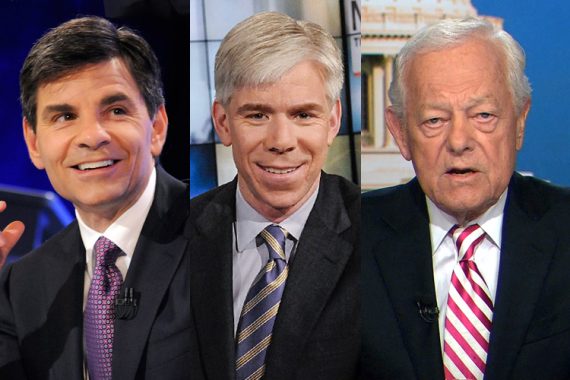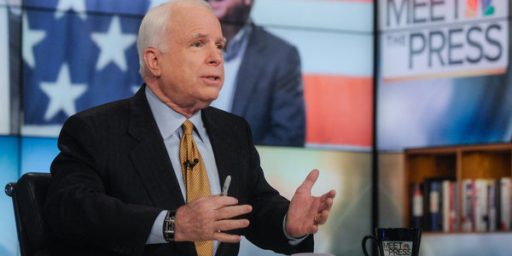Sunday Morning Talk Shows Are The Dinosaurs Of Political Media
Who watches Sunday morning talk shows anymore?
Sunday morning talk shows are among the longest running shows still broadcasting on television. Meet The Press is the granddaddy of the genre, having debuted on television in 1947, although it actually has its roots in a radio show that started broadcasting in 1945. CBS’s contribution to the genre, Face The Nation, has been on the air since 1954 and its current host Bob Schieffer has been hosting she show for 23 years. ABC’s This Week , meanwhile, began in 1981 when veteran NBC anchor David Brinkley joined the network. Fox News Sunday is the baby of the broadcast network shows since it started in 1996 and remains the sole nationwide news broadcast offered by Fox’s broadcast network as opposed to the content on its cable network. In more recent years, of course, cable networks have offered their own versions of Sunday morning program to the point where doing “the full Ginsburg,” meaning making an appearance on all Sunday morning shows on the same day, requires doing appearances on at least seven separate programs.
Despite this plethora of programming on Sunday mornings, though, or perhaps because of it, the Sunday morning talk show genre seems to be in serious trouble:
The Sunday morning shows once occupied a sacred space in American politics.
Today, many influential Washington players can’t even remember the last time they watched.
The public affairs shows — “Meet the Press,” “Face the Nation” and “This Week” — used to set the agenda for the nation’s capital with their news-making interviews and immensely influential audience. Now the buzz around the shows is more likely to center on gossipy criticism about the hosts, notably “Meet the Press’s” David Gregory, whose fate has become an incessant subject of conversation, most recently in a Washington Post story on Monday. Meanwhile, fans complain about the recurrence of familiar guests — Sen. John McCain again? — who simply relay party talking points that often go unchallenged.
“For political junkies and those who just want to catch up, the Sunday shows still are relevant, but they’re not the signature events they once were,” Tom Brokaw, the NBC News veteran who briefly moderated “Meet the Press” in 2008, said in an interview. “I first appeared on ‘Meet the Press’ during Watergate, and it was a secular mass in Washington; the faithful never missed it.”
Political veterans, congressional aides, former administration officials and longtime journalists all attested to the Sunday shows’ decline. The programs are no longer the agenda-setting platforms of days past, they said. Instead, the broadcasts have become a venue for lawmakers to push familiar talking points and for talking heads to exchange conventional wisdom. Occasionally there is an interview or discussion that will make headlines — Vice President Joe Biden’s endorsement of gay marriage, which preceded President Barack Obama’s own announcement, comes to mind. But that has become the exception rather than the rule.
Not surprisingly, the few who adamantly insist that the programs are relevant are the hosts and producers.
“I do not agree that ‘Meet the Press’ is not what it has always been, which is a driver of the conversation,” said David Gregory, the current host, echoing remarks made by ABC’s George Stephanopoulos and CBS’s Bob Schieffer. “Administration figures, politicians and candidates come to ‘Meet the Press’ because they know what ‘Meet the Press’ represents.”
Increasingly, what “Meet the Press” and its competitors represent are still-powerful brands struggling to maintain influence in a radically changed media environment, where news consumption is more fast-paced and fractured than ever and “the news cycle” these shows used to command no longer really exists.
As the article goes on to note, one of the many reasons for the declining interest in, and quality of, the Sunday shows is the simply fact that there isn’t much of anything unique about them any more:
“When I was at the White House and on the Hill, Sunday shows were either the exclamation point at the end of a week or the capital letter that began a new week. Today, they’re part of the endless dot, dot, dots that are part of political coverage,” said Ari Fleischer, the former White House press secretary. “There is so much news and so many outlets, even quality Sunday shows don’t break through like they use to.”
Journalists recognize the change as well.
“The news cycle moves so quickly and with so many diverse entry points for quality political news that it is difficult for the Sunday shows, as they once did, to ‘drive’ the week’s political news,” Jill Abramson, the executive editor of The New York Times, wrote in an email. “A week is now eternity, after all.”
That reality has radically altered the way politicians use the Sunday programs. In the past, the platform was so influential that presidential administrations and lawmakers met nearly every week to strategically plan out appearances, hoping to impact the latest political or policy debate.
“There was a time when everything would stop on Friday afternoon and Cabinet members and senators would gather around a table and say, ‘Who are we putting out on Sunday?'” one former Democratic White House official said. “Now if you want to make news, you can tweet it, or you can call any number of outlets.”
The options for influencing the news today are numerous: A politician can go on cable news, give a newspaper interview, stop by talk radio, hold a press conference or simply send out a tweet. And he or she can do any of those things on a Tuesday night or a Friday afternoon. The news will invariably percolate up the media chain — from the Twitter-chattering press corps to the front pages of leading news sites — and become fodder for next Sunday’s roundtables.
I’m living proof of this observation. There used to be a time when I was a faithful viewer of Sunday morning shows. Indeed, I was probably the only 13 year old in America who enjoyed spending his Sunday morning watching David Brinkley every Sunday morning. As late as the 2008 campaign, Meet the Press with Tim Russert was as close to must-see television for me unless there litterally was nothing going on during a particular weekend. Today, I’m far more likely to be watching Law & Order reruns on TNT or something off of the DVR, while reading Twitter and surfing the Internet than watching Schieffer, Gregory, or Chris Wallace. The only exception might be on a weekend when there is some major breaking news story worth paying attention to, but even then there’s little that the Sunday morning shows can tell me that I can’t get from other sources. Perhaps the only reason left for watching any of these shows, then, is the potential that some politician will commit some kind of gaffe that will become part of the news cycle. But, of course, I can rely on Facebook, Twitter, and my fellow bloggers to provide YouTube copies of those events, sometimes within mere minutes after they’re broadcast.
The other major problem with the Sunday shows, of course, is that they just aren’t offering anything interesting any more. Since most Members of Congress and the Senate travel home during the weekends means that the shows are drawing from the same pool of potential guests week after week. John McCain has appeared on these shows so many times since he lost the 2008 Presidential campaign that it almost seems as those he is the President of the United States. The heads of the Republican and Democratic National Committees have also become frequent guests on these shows, but all they ever do is spout the same party line slogans that you hear from them when they appear on CNN, MSNBC, or Fox News Channel during the week. Beyond that, without fail, the networks are reduced to bringing their own “analysts” and talking heads on as guests, which ends up turning the entire program into a much less interesting version of the kind of conversations you might overhear at a Washington bar, but without the benefit of the participants being slightly inebriated.
Rod Dreher doesn’t watch the Sunday shows either, but he has an interesting proposal:
I don’t know if it’s possible ever to bring them back, but you know what would be worth trying? Bring on some non-traditional types to talk about issues of politics, culture, and public life. Why not ask a philosopher, a theologian, even a novelist to address issues? I couldn’t possibly care less what John McCain says about anything, but I would love to know what, say Marilynne Robinson thinks about health care policy, or what Tom Wolfe has to say about immigration policy. Bring outside voices into the insular conversation. What could it hurt?
As compelling as this idea sounds, it likely won’t ever be implemented. For one thing, real intellectuals sitting down and talking about issues of substances rationally rather than repeating partisan talking points isn’t the kind of television that attracts viewers, one need only compare the relative size of the auidiences for PBS’s News Hour and the evening partisan lineups on MSNBC or Fox News Channel to see the truth of that statement. For another, whatever purpose they used to have, the real purpose of the Sunday morning shows today is to allow the political insiders in Washington, New York, and elsewhere, to hear each other talk. That’s why you see advertisements for defense contractors on these shows all the time, because the advertisers know who the real audience for the show is today. Whether the shows can continue existing given that they appeal to such a narrow audience of people, though, is another question entirely.







Egggzachary…a forum in which to freely spew BS, with absolutely no worry of being faced with difficult questions.
The saddest paragraph in this article:
That is spin. Those are talking points. Al three anchors say them, and on some level they know them to be false, but they don’t think about their words deeply enough to consider whether they’re true. If that’s what you get from the hosts, what do you expect from the guests or analysts?
Maybe they could make the Sunday morning chat shows more interesting with a lightning round.
With real lightning.
And of course, if you get on one of these “talk shows”, it shows that you are A Very Important Person and Have Arrived in Politics.
At least the striving for status at court during the Heian Age in Japan produced a massive amount of poetry, art, and literature. What have the oink-heads who frequent these gabfests ever produced?
Methinks it would be more fun if we could liven this up with audience voting. Except that instead of voting a pundit “off the island”, it would be “off with his head.”
The second article notes that the proliferation of similar shows on cable television is a big problem…because all those shows offer the same thing. That is they offer more of this:
Can anyone name one prime time cable “discussion” program that doesn’t meet this description? If one of the Sunday shows were to actually fulfill the role of the fourth estate, I think you’d be surprised how quickly it would rise above all the other competitors. Instead their response is “Our boring reheating of talking points can’t seem to rise above all the other boring reheating of talking points.”
@Neil Hudelson:
100% spot-on.
The problem is that the 4th Estate is far too concerned with preserving their access…Sunday power brunches and Sidwell-Friends PTA meetings… to do their jobs on even the most basic level.
@Pinky:
Why are we nostalgic about those yester years of Meet The Press and similar Sunday shows?
To me it is pretty much the same stuff. It’s just that our political culture has changed – we now know that no one is a guest on those shows to inform anyone. It is all about being on message, and the question is whether or not the host is ever going to call bulls*** on these guys.
Tim Russert was overrated in that respect, however he did about as workman-like a job as one generally expects. And David Gregory? He gets a lot of criticism because, well, conservatives complain about everything.
@al-Ameda: Tim Russert was uniquely bad at his job, due to the fact that he looked very good at it. He’d set up gotcha questions and ask them, but never follow through on them. You could watch his show and feel vindicated when he “got” someone you didn’t like, but the show wasn’t any more informative than any of the others.
There’ve always been blowhard politicians, and there’ve always been sycophantic journalists. It’s fair game to call out any of them who are doing a lousy job today.
@Pinky:
To me, Tim Russert was the quintessential DC insider and as such he was just part of the “on message” machine that characterizes the Sunday morning opinion shows.
IOW Russert was less a standard-bearer and more an example of the problems.
Who wants to watch that crap when Liverpool is on almost every Sunday morning?
@Neil Hudelson: “Can anyone name one prime time cable “discussion” program that doesn’t meet this description?”
Actually, the two weekend shows on MSNBC — Melissa Harris-Perry and whoever took over for Chris Hayes — tend to pull their talking heads from academia, from labor, from non-profits. You may not like or appreciate what they have to say — or you may, I have no idea — but it’s hard not to applaud these hosts for reaching out beyond the pool of the obvious.
@Neil Hudelson: Oh, but you did say “prime time,” and those two shows ain’t that…
I remember back during the Occupy Wall Street days, This Week actually had an Occupy-er on. Very smart, very articulate — give them credit for finding a good spokesman. But they put him on the Roundtable to discuss economic issues with the standard gasbags like George Will and Cokie Roberts, all of whom managed to keep the conversation within the tiny sliver of discourse that’s allowed between “the right” and “the left” on these shows.
At one point this guest suggested that there might be another way of looking at these issues that never gets raised because he was probably the first person they’d had on the RT in years whose net worth wasn’t in the millions.
There was a lot of hemming and hawing before George cut quickly to a commercial… and that man was never heard from again.
@Bandit:
My weekend default is always the Fox Soccer Channe or equivalent. ANY Premier League match, with Chelsea, Everton, Arsenal, Man City, Man U, or Liverpool is preferable to any Sunday morning “news” show.
@Bandit:
Sundays are for the beach, not tv.
@C. Clavin:
I think they know they will be peppered with silly “gotcha” type questions though. The search for a news-breaking quote is “journalism” to folks like Dick Gregory.
The problem of the Sunday Morning Shows is that Politicians can find even more friendlier venues than David Gregory. You can always go to see Sean Hannity or someone on MSNBC, where the questions are even more ridiculous.
By the way, I remember that SEVERAL candidates refused to appear on these shows when they were running(I remember that “I´m not a Witch” woman refusing to appear on Face The Nation).
The BBC has tough interviewers like David Dimbleby and Jeremy Paxman precisely because they are a monopoly in their home country.
A show that told us what Tom Wolfe thought about much of anything is competition for Charlie Rose, which is on 5 days a week. Once again this does not distinguish the Sunday shows.
I don’t remember watching a Sunday show since 2008. I yelled at the TV entirely too much to look forward to watching another one. I distinctly remember that Ed Rendell was on.
Greenwald/Snowden are more powerful media figures than anyone who hosts a Sunday show now. They have gotten there because they knew how to be skeptical about the organized media and also how to make it work for them.
If the hosts treated the interviews more as interrogations, and you had to strap the guests in to keep them from bolting from the room, that’d be entertaining (and informative!) television.
Hell, if they discussed politics intelligently instead of repeating talking points, it’d be entertaining.
One of my most glorious television memories is of stumbling across William F. Buckley’s show (Firing Line?), on an episode where his guests were Norman Mailer and Kurt Vonnegut, Jr. Buckley was trying to shame them for participating in an international writer’s organization called PEN that sometimes gave money to writers in communist countries. Mailer and Vonnegut held their own just fine. It was a pleasure to watch three intelligent, erudite, and utterly irreconcilable people have a spirited dispute.
Quote of the day:
MR. VONNEGUT: Yes, I certainly– I mean, my politics are
grotesque, for one thing —
MR. BUCKLEY: You’re quite right. Yes. [laughter]
Huh. A quick Google shows me that this episode aired in 1986, and that transcripts and video are available online. Ain’t the internet wunnerful?